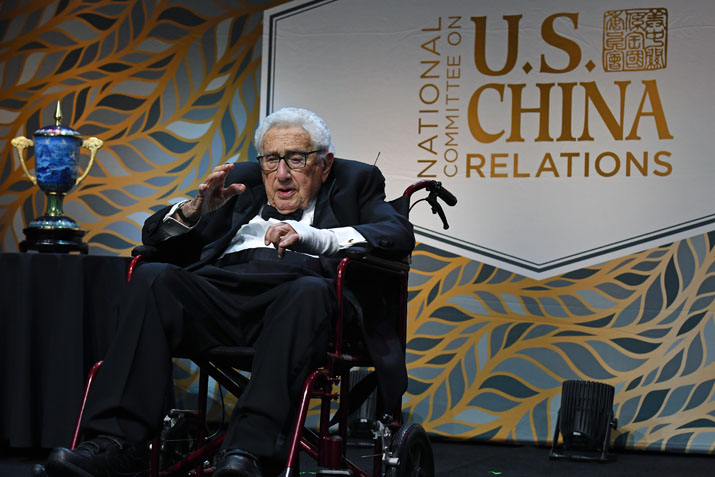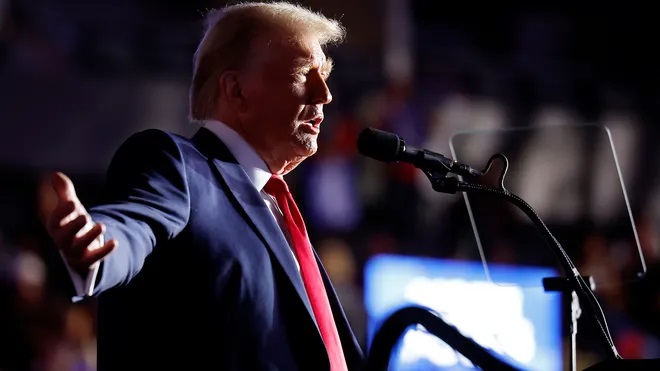First published in Eurasia Review
Photo: Former U.S. Secretary of State Henry Kissinger speaks at the Gala Dinner of the National Committee on U.S.-China Relations in New York City on October 24, 2023 (Credit: XINHUA)
Amidst the tributes honouring the late American diplomat Henry Kissinger, who breathed his last at the age of 100, a narrative simultaneously got underway across online conduits as well as in sections of international media. In certain circles, Kissinger found himself branded with different labels, symbolizing actions perceived to reverberate with far-reaching global consequences. This perceptible variance in opinions and assessments shows the obfuscated political legacy left by a diplomat who was ‘indispensable’ in shaping American foreign policy in the 1960s and 1970s.
Kissinger—a hardcore realist whose influence pervaded the corridors of American foreign policy under the tenures of Presidents Richard Nixon and Gerald Ford—negotiated and helped make decisions in momentous geopolitical settings, including the disengagement of the United States from Vietnam and the initiation of diplomatic overtures with China. Nevertheless, his legacy, particularly in the region of South America, as well as in South and Southeast Asia, is dented by accusations of promoting aerial attacks and support for repressive military autocracies. Kissinger was criticised for his alignment with authoritarian regimes, which professedly conceived as a strategy to counteract the ideology of communism.
Official records substantiate the complicity of Nixon and Kissinger in endorsing the 1973 coup that deposed Allende, the incumbent president of Chile. The aftermath of this stage-managed upheaval by General Augusto Pinochet manifested in widespread violation of human rights, including political executions, electoral annulments, and media encumbrances. Similarly, his involvement in the bombardment of Cambodia and endorsement of the Pakistan military’s coercive actions against the people of East Pakistan was well established. Numerous scholars and observers had previously identified a spectrum of issues contributing to his unfavourable portrayal. For example, in The Price of Power (1983), Seymour Hersh depicted Kissinger as an “unhinged paranoiac,” while Christopher Hitchens, in The Trial of Henry Kissinger (2001), framed his critique as a comprehensive charge sheet, advocating for Kissinger to be prosecuted as a war criminal. Thus, his ‘inevitable presence’ in the West’s containment project remained a topic of discussion among scholars of International Relations. What adds intrigue to Kissinger’s legacy is its enduring impact on China, a communist country with a distinct geopolitical trajectory.
China in Kissinger’s Diplomacy
China responded to Kissinger’s demise with an overwhelming outpouring of tributes from current officials, former officials, academics, and ordinary citizens. This is in stark contrast to the mixed views prevailing in the West regarding Kissinger’s role in U.S. foreign policy. However, his standing in China is characterized by universal reverence and respect. The Chinese official sources, including the influential media like Global Times referred to Chinese people as having “mourned the loss of a wise mind who witnessed the world’s turbulence and prosperity in the past century, while others expressed their appreciation for his contribution to China-US relations, which is considered the most important relationship in the current world.” Global Times wrote that Kissinger, who visited China over 100 times throughout his life, made his last trip to Beijing in July 2023 during a period of heightened tensions in China-US relations. During this visit, Chinese President Xi Jinping met with Kissinger, acknowledging and praising his significant role in fostering bilateral relations. President Xi emphasized the enduring value the Chinese people placed on friendship, expressing gratitude for Kissinger’s historic contributions to promoting the growth of China-US relations. Xi reflected on the significant decision made 52 years ago, when Chairman Mao Zedong, Premier Zhou Enlai, President Richard Nixon, and Kissinger demonstrated extraordinary strategic vision in normalizing China-US relations. This decision, according to Xi, not only brought benefits to both countries but also had a transformative impact on the world, as reported by the Global Times.
Admittedly, China has attracted global attention since the collapse of the Soviet Union, emerging as one of the top economies. Questions had emerged about the impact of its economic rise on global politics, military power, and the management of the global economic system. Many said that China’s adherence to Western institutions facilitated its growth. Policy analysts like Kissinger agreed that China’s dynamic growth made it a major force with significant implications for international relations.
In 2005, Kissinger, a key architect of U.S.-China policy in the 1970s, predicted in the Washington Post that the rise of China and Asia would reshape the international system, shifting the global political centre to the Pacific. He cautioned against assuming a strategic confrontation akin to imperial Germany, emphasizing China’s preference for patient and balanced approaches. In his book, On China, Kissinger discouraged substituting China for the Soviet Union in policy thinking, highlighting the historical differences in imperial traditions between the two nations. He stressed that the Chinese state, existing for 2,000 years, relied more on cultural conformity than force, cautioning against Cold War style military containment.
Kissinger’s On China garnered widespread global attention and extensive reviews. With a rich history in diplomacy and foreign policy, Kissinger engaged in diplomatic initiatives, notably contributing to the opening of American relations with China in the early 1970s. Drawing on decades of personal acquaintance with Chinese leaders and access to historical source material, Kissinger explored China’s diplomatic, strategic, and negotiating approaches throughout its extensive history.
In his writing, Kissinger addressed key questions about China’s role in global power dynamics in the twenty-first century. He went into major milestones in Chinese foreign policy, covering traditional China’s sensitivities and strategies. He also skillfully reexamined the well-known Chinese grievance of the “century of humiliation” and underscored China’s historical fear of encirclement, considering earlier challenges such as those posed by the Mongols.
Kissinger’s work on China extensively examined critical events since Mao’s emergence, encompassing internal-external dynamics of Chinese diplomacy, Sino-European interactions, the evolution and schism of Sino-Soviet ties, the Korean War, the thaw in Sino-American relations during the Nixon era, the Taiwan Straits crisis, the Great Leap Forward, the Sino-Indian war, Cultural Revolution, post-Mao reforms, Deng’s foreign policy, Tiananmen, the Jiang Zemin era, and China’s ‘Peaceful Rise,’ among other significant topics. Kissinger commenced his narrative in the book with Mao’s meeting with top political and military commanders during the 1962 India-China border standoff. The context was a negotiation impasse, prompting Mao to decide to break the stalemate. Referring to historical conflicts, Mao recounted that China and India had fought “one and a half” wars, drawing operational lessons from each. The first, during the Tang Dynasty, involved suppressing an Indian kingdom, leading to centuries of flourishing exchanges. Mao emphasized that perpetual enmity was not inevitable, but to secure peace, China needed to use force to bring India to the negotiating table, Kissinger wrote.
He appreciated the uniqueness of Mao invoking millennium-old events to guide contemporary strategic imperatives. Shortly after Mao’s discourse, China executed a sudden, devastating offensive against the Indian position. Kissinger noted the unprecedented nature of a modern leader initiating a major national undertaking by referencing ancient events and expecting colleagues to grasp the significance of these allusions, highlighting the distinct nature of Mao’s strategic approach.
Kissinger’s stance on China was widely recognized due to his decisive role in diplomatic relations between the West and China in the 1970s. Dismissing the notion of China dominating the world, he suggested that the country’s political leadership would focus on aligning political institutions with its economic transformations. In a discussion, Kissinger expressed, “I do not believe that a country that will be so preoccupied with this fundamental change will also have the time to dominate the world.”
While neither the more optimistic Chinese analyses nor the American perspective, asserting that a successful Chinese ‘rise’ is incompatible with America’s position in the Pacific and the world, have received official endorsement from either government, these viewpoints underlie much current thought. If these assumptions were adopted by either side, it could potentially lead to escalating tensions between China and the U.S., emphasizing the delicate nature of their relationship.
The relationship between the U.S. and China involved strategic considerations where each nation seeks to shape the other’s influence. China aims to push American power away from its borders, limit U.S. naval strength, and diminish its weight in global diplomacy. On the other hand, the U.S. endeavoured to rally China’s neighbours into a counterweight against Chinese dominance, emphasizing ideological differences. The tricky interaction is further complicated by asymmetrical notions of deterrence and preemption—where the U.S. focused on overwhelming military power, while China prioritized decisive psychological impact, increasing the risk of miscalculations.
The key question revolved around realistic expectations. Explicit American attempts to organize Asia for containment or an ideological bloc faced challenges due to China’s vital trade partnerships. Similarly, Chinese efforts to exclude the U.S. from Asian affairs met resistance from other regional states fearing the repercussions of a single-power dominance. The nature of the Sino-American relationship was more accurately characterized by Kissinger as ‘coevolution’ than a partnership. Both nations pursued domestic imperatives, cooperating where possible, and adjusting their relations to minimize conflict. While not fully endorsing each other’s aims, they strived to identify and cultivate complementary interests.
In seeking to demonstrate his profound understanding of Chinese strategic thought, particularly those enduring over centuries among successive generations of Chinese policymakers and statesmen, Kissinger emphasized the Chinese as adept practitioners of realpolitik. He contended that their strategic doctrine differed markedly from Western preferences in strategy and diplomacy. According to Kissinger, China’s turbulent history instilled in its leaders a recognition that not every problem has a straightforward solution, cautioning against an excessive focus on total mastery over specific events, which could disrupt the harmony of the universe. Chinese statesmen, he observed, rarely gambled the outcome of conflicts on singular all-or-nothing clashes, favouring instead elaborate, multiyear manoeuvres aligned with their strategic style.
Contrasting Western traditions that value decisive clashes and heroic feats, the Chinese ideal, as described by Kissinger, emphasized subtlety, indirection, and the patient accumulation of relative advantage. This distinction highlighted the strategic approach entrenched in Chinese geopolitical thinking throughout history.
Kissinger perceived the Washington-Beijing relationship as plagued by ambiguity, with some U.S. academics and policymakers strongly critical of China, labelling post-Cold War policies as ‘appeasement.’ Whether anti-Communists or human rights activists, many advocated regime change in Beijing. However, the feasibility of inducing ‘peaceful evolution’ in China remained elusive, acknowledging Washington’s limited influence since the 1950s.
He believed that the concept of a ‘China threat’ revolved around its growing capacity to disrupt the existing international order. Militarily, China is seen as acquiring capabilities to project power beyond East Asia and challenge the U.S. Navy, particularly near Taiwan. Economically, its increasing demand for raw materials has driven commodity price hikes, expanding extraction operations globally. The intentions behind China’s newfound power remained unclear, with official assertions denying aggressive motives, emphasizing its developing status and projecting decades before military parity with the U.S. Yet, scepticism persisted among American scholars and policymakers regarding the sustainability of China’s rise. Some anticipated a regime fall, foreseen economic slowdown, and highlighted growing domestic unrest manifested in tens of thousands of anti-government demonstrations annually. Despite these concerns, China’s economic growth contrasts starkly with current struggles in Europe and the United States.
According to Kissinger, the strategic dynamics in Asia differed significantly. He advised against fixating on China’s military buildup, noting that while China increased its military capabilities, its defence budget was less than 20% of America’s. The key test for Beijing’s intentions, he argued, lies in whether its rising capabilities aim to exclude America from Asia or contribute to cooperative endeavours. Kissinger advocated a strategy of maintaining close relations with all major Asian countries, including China, as the best approach for achieving anti-hegemonic objectives. He viewed Asia’s rise as a critical test for American competitiveness in the evolving global landscape, particularly in Asian countries.
Kissinger observed that many Chinese, both within and outside the government, perceived Washington as seeking to contain and restrict China’s rise. He warned against self-fulfilling prophecies, emphasizing the interconnectedness of the United States and China in a globalized world. A Cold War scenario, he contended, would lead to international alignment and exacerbate disputes globally when comprehensive global solutions are required for issues like nuclear proliferation, the environment, energy, and climate.
Highlighting that conflict is not inherent in a nation’s rise, Kissinger pointed to the U.S. in the twentieth century as an example of achieving eminence without conflict with dominant countries. He argued that Sino-U.S. relations did not need to follow a confrontational path and could find adequate cooperation on contemporary issues. However, he noted the absence of an overarching concept for their interaction, unlike the Cold War period where a common adversary facilitated cooperation. Despite the potential for collaboration, both countries lack a shared framework amidst the challenges of a globalized world undergoing political, economic, and technological upheaval. According to Kissinger, most Chinese view their country’s rise not as a challenge to the U.S. but as a return to a historically preeminent position, considering the past two centuries of relative weakness as an abnormality.
Kissinger did not advocate abandoning Taiwan, but he emphasised that the relationship with China was too crucial to risk continuing robust support for democratic Taiwan. Throughout his career, Kissinger championed realpolitik, admiring figures like Bismarck who prioritised national interest over ideals. He saw leaders like Zhou and Mao as effective strategists in his pragmatic image.
In the context of China’s rise, Kissinger argued for an end to American criticism of China’s one-party system and human rights abuses. Embracing the Westphalian notion that states should refrain from interfering in each other’s internal affairs, he considered the Chinese as contemporary model Westphalians. To avoid conflict with China, Kissinger suggested yielding on these points and focusing on shared interests.
While acknowledging human rights violations as grounds for reconsidering relationships, he contended that applying this criterion to countries crucial for American security, especially China, would pose challenges. He warned against making democratic governance a condition for progress in other areas, asserting that such insistence would lead to inevitable deadlock. Kissinger proposed a pragmatic approach, urging idealists to recognize the need for occasional adjustments based on circumstances and realists to acknowledge the reality of values in operational policies.
In an interview in 2021, he said:
In dealing with China, different schools of thought have to be sorted out. There’s a group who thinks the Chinese capacity for foreign policy must be confronted at all levels from economics to Chinese internal politics. It ascribes current Chinese policies to the current Chinese leadership and strives for bringing about a more accommodating group. I, on the other hand, believe that such an attitude generates a maximum of resistance. Of course, free societies must continue to conduct world affairs compatible with their principles and free of the threat of hegemony. But coexistence in the current world of technology is a necessity, because it is impossible to visualize a war between major countries who have significant AI technology that will not destroy cultural life as we know it. So that will be the debate in America and maybe in the world.
According to Kissinger, Europe should refrain from exploiting tensions between the United States and China, as doing so may intensify confrontations and worsen crises. Rather than endorsing an aggressive stance against China, he supported the idea of fostering a shared strategic understanding among nations. It is crucial to avoid escalating the situation through constant maneuvering for advantages, emphasizing a more measured and cooperative approach to international relations.
In his surprise visit in July this year, Kissinger expressed his friendship towards China and urged both nations to enhance their cooperation. He emphasized the importance of eliminating misunderstandings, promoting peaceful coexistence, and steering clear of confrontations between the United States and China. Kissinger asserted that past experiences have consistently demonstrated that treating either country as an adversary is not a viable or affordable approach for either the United States or China.
In sum, Kissinger persistently grappled with a critical inquiry as he highlighted in his work on China and the West: Does China’s ascent inevitably culminate in conflict with the United States? Drawing parallels with Germany’s rise a century ago, he cleverly admitted the potential for heightened tensions while maintaining an optimistic outlook. He emphasised that history, despite its patterns, unfolds without mechanical repetition. Exploring further, Kissinger offered thoughtful insights into Chinese history and foreign policy, atypical of the perspective of a former U.S. policymaker. This perspective renders the topic relevant for debates among International Relations scholars.
References
Kissinger, Henry A. (1979): White House Years, New York: Simon and Schuster.
Kissinger, Henry A. (1982): Years of Upheaval, New York: Simon and Schuster.
Kissinger, Henry A. (2005): “China: Containment Won’t Work,” The Washington Post, 13 June.
Kissinger, Henry A. (2011): “Avoiding a US-China Cold War,” The Washington Post, 14 January.
Kissinger, Henry A. (2011): On China, New York: Penguin Press.
Seethi, K.M. (2011): “China’s ‘Peaceful Rise’ in the New Millennium,” Indian Journal of Politics and International Relations, Vol.4. Nos. 1&2. January- December.
Seethi K.M. (2021): Enduring Dilemma: Flashpoints in Kashmir and India-Pakistan Relations, New Delhi: KW Publishers.





A gentle colossus, but with a tainted history of fostering violence.